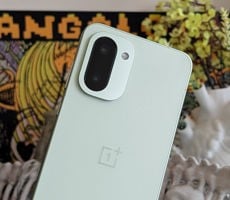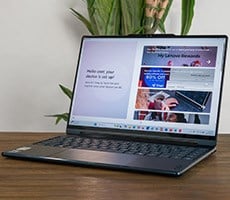If there's a sleeper phone that's been on our radar for a while here, it's the
LG V30. LG has been teasing this phone for what seems like an eternity. We actually got our
first hands-on time with it a couple of months ago in August. However,
LG has been conservative with its last couple of handset roll-outs, taking the same preview tease approach with the LG G6, where we got an early look prototype unit and firm rules of engagement with it before final production units arrived. The
G6 was one of the first generation thin bezel phones on the market at the time and LG wanted to make doubly sure it was ready for prime time when it shipped. The same can be said for the new V30, as this device feels like a true spiritual successor to the previous gen
LG V20 flagship in every way, with a larger, punchier OLED display, a thinner, lighter profile, more horsepower and an amped-up camera array. LG really wanted to get this phone right.

So, of course, LG took their time putting the finishing touches on the LG V30 and today we have our full assessment of it for you, after living with a final production unit for a couple of weeks now. LG's V series line is its full-featured Android offering with all the bells and whistles and the most premium materials and build quality the company has to offer. Does it have the chops to compete with the likes of Google's new
Pixel 2, the Samsung Galaxy S8+ and other top shelf Android offerings?
We won't tip our hand too early, but what you may have read previously, we don't think may have given the V30 a fair shake. We're here to set the record straight and feel LG's got something special with its latest premium Android phone...
 |
|
LG V30 |
| Specifications & Features
|
|
 Price: AT&T $809, Verizon $840, T-Mobile $800, Spring LG V30+ $912
Price: AT&T $809, Verizon $840, T-Mobile $800, Spring LG V30+ $912
With a lead-in (and pricing) like that, you're probably looking for spec stand-outs from the get-go and we wouldn't blame you. Fortunately, LG delivers with one of the most cutting-edge setups technically that you'll find in an Android phone currently.
Snapdragon 835, OLED display, dual rear cameras, wireless charging, Bluetooth 5, Hi-Fi Quad DAC and a stout 3300 mAh battery -- it's all in there. About the only thing you could argue is missing here might be Android 8.0
Oreo, but that's currently a Google
Pixel or
Nexus exclusive. Face and voice recognition, a fingerprint reader, USB-C and yes, a good ol' fashioned 3.5mm headphone jack; whatever you'd want on the Android or iOS platforms is here and it's all protected with IP68 water and dust resistance and Corning Gorilla Glass 5.

 Left To Right: Samsung Galaxy S8+, Google Pixel 2 XL, LG V30
Left To Right: Samsung Galaxy S8+, Google Pixel 2 XL, LG V30
The good news is the LG V30 packs all that technology into a very efficient footprint, or should we say handprint. With a 6-inch Quad-HD display (2560x1400 res) and super-thin bezels all around the device, the V30 is easily one of the smallest handsets with a 6-inch screen on the market right now. Versus the 6.2-inch
Samsung Galaxy S8+ and the 6-inch Google Pixel 2 XL, the 6-inch LG V30 looks downright petite.

LG also kept the V30's bundle as diminutive as its frame this time around, offering just a microfiber cloth, SIM tool,
QuickCharge Adapter, and a lit pack in the box. And rather than including a USB Type-C cable with USB conversion dongle, LG went with a
USB-C to standard USB converter cable to simplify hook-up with legacy devices. You might prefer native USB-C connectivity but for all intents and purposes it's a toss-up and the converter cable is probably more functional for the average mainstream user.
Let's pull in tight for a closer look at the V30's design and build quality next...










